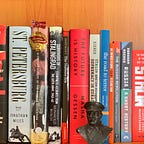Is the Hijab just a piece of cloth?
Why a conflict exists around an article of clothing
In the past few decades, Islam has elevated itself from barely being discussed in the broader Western media, to a topic that has become as polarizing as it is complex. For as easy as it is to condemn Evangelists, Catholics and Protestants, condemning Islam can bring out a level of vitriol from believers that is far in excess and disproportional to any criticism leveled against it.
With a religion that has an estimated 1.8 billion followers, Islam is not about to disperse like a small cloud on a hot day. As all religions struggle in the face of a more learned ‘flock’ that is questioning the written assumptions made by these outdated myths, it is clear that unless a strong stand is made by their leaders, they will lose followers and the power it brings. There are many religions on this planet that set rules by which the faithful should behave or dress but many of these are marginal limited in size. This is not the case for Islam.
To go through all the contradictions that exist in one religion would require far more space than is available here. To narrow the gaze somewhat then, I want to turn to the Hijab and understand why it has become a banner both for and against Islam.
From the perspective of the Quran, the Hijab is described as a ‘curtain’ to separate or hide something. This is applied to the wives of the prophet and is used as an instrument to protect the prophets private life. The application of this veiling to only his wives is vastly different from a requirement that all Muslim women should be veiled. As was highlighted in the 1979 protests by Iranian women protesting the wearing of the Hijab. Iran was still a Muslim country but was progressive in it’s beliefs. It wasn’t until the revolution that a more fundamentalist religious doctrine was applied.
So why then, has the Hijab turned from being protested against in a Muslim country to now being seen as a sign of empowerment for other Muslim women? There is little doubt that it can be viewed as visible sign of peoples faith in Western secular countries and a way of uniting people with a common interest. And that is a fair point. However, beyond that, there is very little in the way of commonsense that can be applied.
As discussed above, it was the introduction of a more hard line Islamist dogma that mandated that women wear a Hijab by male leaders of the religion. This should be the first call to action in claiming back the rights of women to be told what they should wear and how they should be seen in public. More disturbingly, there a feminists in the West that claim the Hijab as a sign of strength that allows women to be different and identified. Which then means that these feminists are paying homage to an oppressed male run religion dictating how women live. Have we regressed this far in society that any gains in equality are now being subtracted by these actions?
Yasmine Mohammed, possibly one of the most interesting a bravest women around, adds to the anti Hijab discussion following her emancipation from Islam and it’s stifling doctrine. Her opposition to the World Hijab Day by setting up No Hijab Day shows how she see’s what the significance of being ‘veiled’ means. Where as my views are those of someone who claims a slight amount of enlightenment and the need to a more atheistic and humanitarian approach, I challenge anyone to argue Mohammed’s view on the matter given her background. All I seek to do is validate her points.
There will always be people that seek a religious faith as a means of giving purpose and meaning to life. I can’t stop them but I do implore them to seek alternate answers or views before becoming fully committed. Applying a dogma that goes against the right of humans to be able to express how they look or act though, is a bit too much though. We need more enlightened individuals like Mohammed to be heard. There are plenty of women out there with similar views and we should not stand in fear of a religious group and have commonsense rejected.
